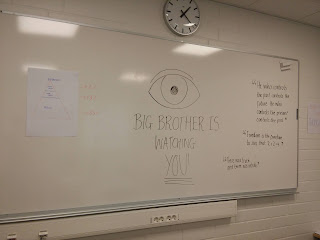#blessed
...Most of us have seen this hashtag when scrolling through Instagram. But what is the reality behind the picture? This was the focus of last Monday's International Studies lesson: to think about the extent to which social media really portrays reality.
To start with, we explored Edward Tory Higgins' "self-discrepancy theory". Higgins theorised that the self is split into three parts: the "actual" self, the "ideal" self, and the "ought" self. The "actual" self encompasses all of the characteristics that we or other people believe we have. The "ideal" self concerns all of those characteristics that we wish we had. The "ought" self is about those characteristics that we or other people think we should have.
Taking this idea of how we perceive ourselves and others, I challenged the students to work in groups and make memes based upon how they are seen as students. Here are the (hilarious) results:
We then examined the sense of "perfection" that many Instagram posts promote and how our social media pages may reflect our "ideal" selves rather than our "actual" selves. Naturally, we decided to parody some of the most popular types of posts that you might see...

Overall, this was a fun lesson with a rather serious message to never blindly trust what appears on social media.
Throughout the rest of the week, there were plenty of other lively things happening. The International Club sessions in Merenojan were a particular highlight, with one group focusing upon finishing a project in order to visit Portugal and the other shopping with me to buy the ingredients for some pancakes! It is, after all, Shrove Tuesday in England tomorrow which is a day when people eat...you guessed it... lots of pancakes. If last week is anything to go by, this week is sure to be another great one! 😄
Taking this idea of how we perceive ourselves and others, I challenged the students to work in groups and make memes based upon how they are seen as students. Here are the (hilarious) results:
#fitness #workout #feelsgood #gymtime “#justdoit #getfit #beachbody
Throughout the rest of the week, there were plenty of other lively things happening. The International Club sessions in Merenojan were a particular highlight, with one group focusing upon finishing a project in order to visit Portugal and the other shopping with me to buy the ingredients for some pancakes! It is, after all, Shrove Tuesday in England tomorrow which is a day when people eat...you guessed it... lots of pancakes. If last week is anything to go by, this week is sure to be another great one! 😄



































